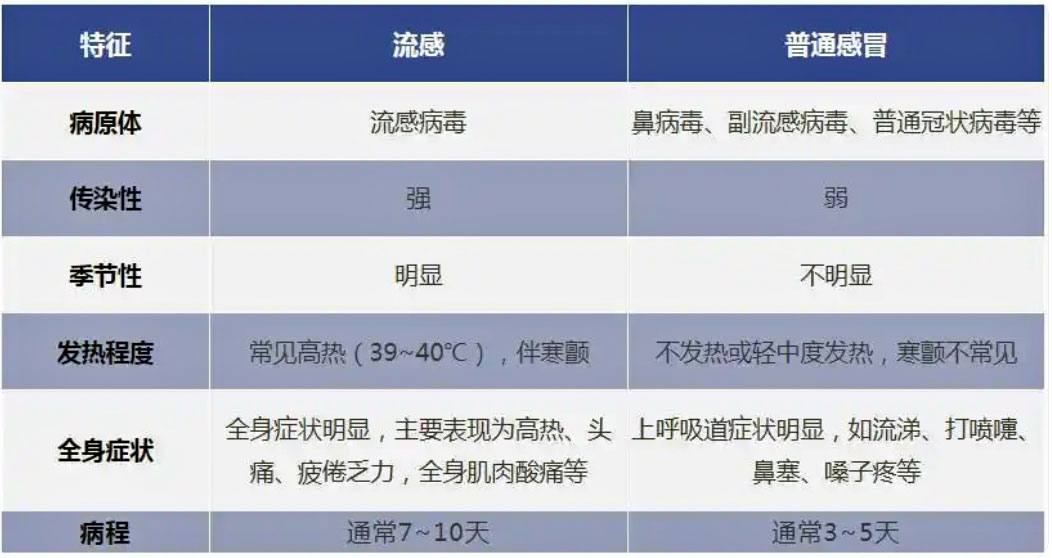On February 3, according to Taiwanese media reports, Taiwanese actress, singer, and host Barbie Hsu (Big S) died of influenza-related pneumonia at the age of 48.
When the bad news came, netizens expressed their regret and condolences on social media, which also triggered a public discussion on "influenza": Why is influenza so dangerous? What is the difference between influenza and the common cold?
Influenza is not just a common cold
According to the World Health Organization, seasonal epidemics of influenza viruses can cause an average of about 3 million to 5 million severe cases and 290,000 to 650,000 respiratory disease-related deaths each year worldwide.
首都医科大学附属北京佑安医院呼吸与感染性疾病科主任李侗曾: 如何区分普通感冒和流行性感冒?
In many people's minds, influenza is similar to the common cold, and its severity has been greatly underestimated by many people; this incident once again confirms that influenza has the risk of severe, critical and death.

Image source: China Center for Disease Control and Prevention
The common cold mainly has symptoms such as nasal congestion, sneezing, runny nose, and low to moderate fever, but rarely has obvious headaches, muscle aches and other general discomfort.
Influenza often has an acute onset and rapid progression, with obvious fever (some people's body temperature can reach 39~40°C), accompanied by sore throat, chills, headache, muscle and joint pain, extreme fatigue, loss of appetite and other systemic symptoms, and vomiting and diarrhea may also occur.
How dangerous are influenza complications?
Although influenza will improve on its own in most cases, some patients may have serious complications. Pneumonia occurred after the flu, and some patients may have myocarditis.
Direct damage to myocardial cells
Joel Kahn, professor of cardiology at Wayne State University School of Medicine, said that influenza viruses can directly damage myocardial cells, and persistent viral infection can lead to loss of myocardial cell metabolism and function, and eventually cause myocardial cell dissolution and necrosis.
A study published in the New England Journal of Medicine showed that influenza infection is associated with an increased risk of acute myocardial infarction, especially for those without coronary heart disease.
When a person is infected with the influenza virus, the body will produce a strong inflammatory response, followed by increased metabolic demand, leading to unstable or even ruptured plaques, and increasing the incidence of myocardial infarction.
8 factors that aggravate influenza
According to media reports, in the past, Big S was rushed to the hospital for emergency treatment due to recurrence of epilepsy many times, and her mother also revealed that she also suffered from mitral valve prolapse. These factors may cause her condition to worsen.
The Centers for Disease Control and Prevention of the United States has analyzed the relevant data of patients hospitalized for influenza from 2010 to 2023 in detail, and summarized 8 risk factors that may aggravate influenza.
- Age: Infants and the elderly have weaker ability to resist infection and have the highest rate of hospitalization.
- Not vaccinated against influenza: People who have not been vaccinated against influenza are more likely to be hospitalized for influenza.
- Neurological diseases: Children with neurological diseases such as cerebral palsy, epilepsy, attention deficit hyperactivity disorder, etc. may not cough on their own or cannot clear the fluid in the respiratory tract in time, which may aggravate influenza or cause pneumonia.
- Lung diseases: People with asthma, chronic inflammation of the respiratory tract and chronic obstructive pulmonary disease may have difficulty breathing due to influenza.
- Pregnancy: During pregnancy, the immune system is suppressed, making it more difficult to fight infection. Nearly 30% of women of childbearing age who are hospitalized for influenza are pregnant women.
- Obesity: Obesity affects deep breathing, which is necessary to clear lung infections. Obesity is often associated with other metabolic diseases, such as diabetes, and flu can make blood sugar levels more difficult to control.
- Heart disease: About half of adults hospitalized for flu have heart disease. Studies have shown that flu increases the risk of heart disease and stroke in people with cardiovascular disease.
- Hypertension: In the past two flu seasons in the United States, about 75% of hospitalized patients over the age of 65 had high blood pressure, and flu also puts more pressure on their hearts.
Influenza is a common disease with headache, fever, myalgia, and general discomfort as the main symptoms. In the absence of complications, it is usually self-limiting. The fever symptoms will be relieved about 3-5 days after the onset of the disease, and basically the systemic symptoms will also improve. It will take about 7-10 days to recover.
Once complications such as pneumonia occur, the course of the disease may be relatively long. People with high-risk factors may develop serious consequences. Surveys show that patients with chronic underlying diseases are more seriously ill after flu infection, and their risk of death is 11.3 times that of healthy peers.
From the perspective of disease prevention and protection of susceptible populations, vaccination has always been the most economical and effective way to prevent infectious diseases or control infectious diseases. The same is true for influenza vaccines. Annual influenza vaccination is the most effective means to prevent influenza and reduce related severe illness and death.
How to deal with it scientifically after being diagnosed with flu?
According to various guidelines, it is recommended to use antiviral drugs for early treatment (within 48 hours of onset), especially for high-risk groups.
Seize the golden treatment period
48 hours after onset is the golden period for influenza treatment. At this time, the virus replicates actively. Early use of antiviral drugs (such as oseltamivir, mabaloxavir, etc.) can improve symptoms as soon as possible and reduce the risk of transmission to high-risk groups around you.
In addition to antiviral drugs, some drugs can also be used symptomatically, such as antipyretics for high fever, cough suppressants for severe cough, and common cold medicine for runny nose.
Prescription drugs are recommended to be used under the guidance of a doctor, and self-medication may cause liver and kidney damage.
In addition to timely treatment, the most important thing after suffering from influenza is to rest well, avoid fatigue, supplement nutrition, and pay attention to drinking more water.
Once you have influenza, if the symptoms are not serious, healthy people can observe at home for 3 days first, and then seek medical treatment if there is no improvement; high-risk groups need to seek medical treatment in time.
On the basis of symptoms such as fever and headache, people who have chest pain, chest tightness, shortness of breath, accelerated heartbeat and other heart discomfort symptoms have an increased risk of cardiovascular disease and should seek medical attention immediately.
How can we effectively prevent it?
It is recommended to do 5 things to prevent infection.
- Get vaccinated in time: Getting a flu vaccine every year is the most effective way to prevent influenza, which can significantly reduce the risk of influenza and serious complications in the vaccine recipient. It is generally recommended to go to the community hospital for flu vaccination from September to November every year. For high-risk groups of influenza who may develop severe illness, the flu vaccine can be given at any time.
- Wear a mask scientifically: It is recommended to wear a mask throughout the medical treatment process; it is recommended to wear a mask in crowded places or when taking public transportation (such as airplanes, trains, subways, etc.). If conditions permit, try to maintain a social distance of more than one meter.
- Maintain good hygiene habits: Wash your hands frequently and try to avoid touching your eyes, mouth and nose with your hands. When coughing or sneezing, cover your mouth and nose with a tissue.
- Avoid crowded places: During the season when respiratory infectious diseases are prevalent, high-risk groups such as the elderly and young children should try to avoid going to closed and crowded places; if they really need to go, they should wear masks scientifically to reduce the risk of infection.
- Prevent cross-infection: If a family member has a respiratory infectious disease patient, try to avoid close contact with other family members, especially the elderly and children.
2月3日,据台媒报道,中国台湾女演员、歌手、主持人徐熙媛(大S)因流感并发肺炎去世,年仅48岁。
据媒体报道,知情人士透露了大S病逝前的时间线:
1月29日,大S与家人到日本家族旅行,在出发前已身体不适,但还是强撑病体出发,一行人先到箱根,大S身体状况并未转好。
1月31日晚大S身体状况急转直下,被救护车送往急诊。
2月1日转往东京,但病情并未好转。
2月2日凌晨再度被救护车送往医院就医,然而治疗无效过世。
噩耗传来,网友在社交媒体上表达痛惜和哀悼之余,也引发大众对「流感」的讨论:流感为何如此凶险?流感和普通感冒区别在哪?


